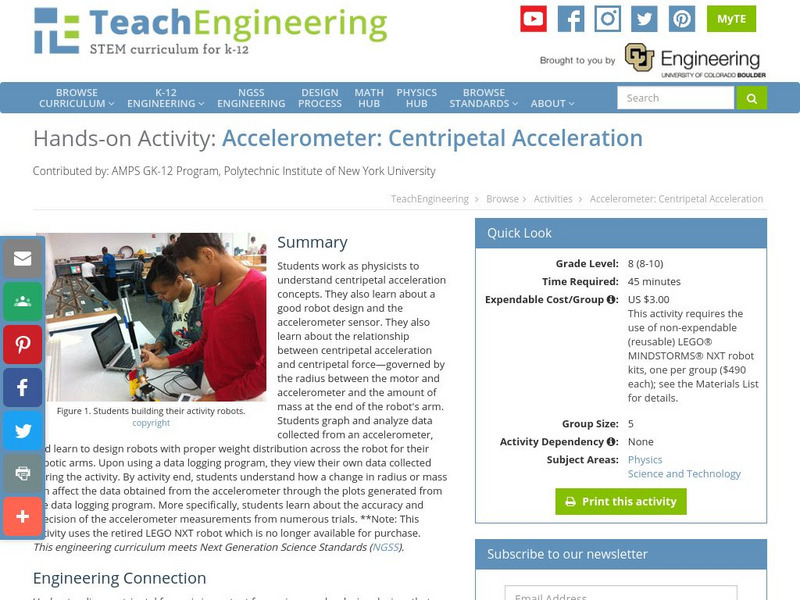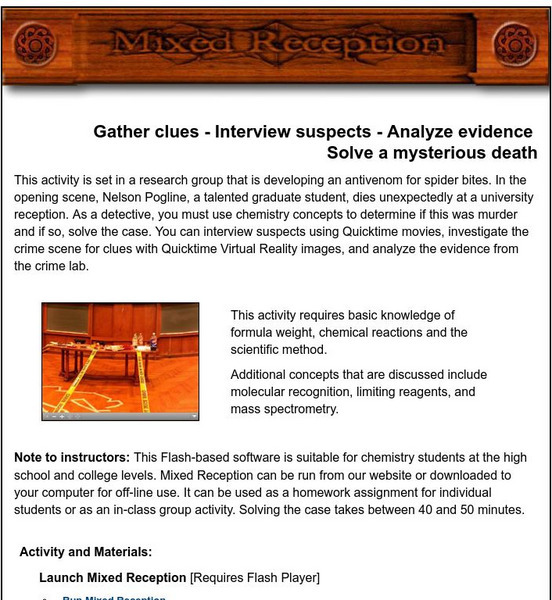Hi, what do you want to do?
SMART Technologies
Smart: May the Forces of Push and Pull Be With You!
Read, brainstorm, drag objects, erase to reveal answers, and move weights on a balance scale to learn about forces, mass, gravity, weight, and balance in this activity created by SMART.
Oswego City School District
Regents Exam Prep Center: Metric Conversions and Rates
Find out all about measurement in this test prep lesson exploring English and metric measurement. Students can compare metric and customary measurements using the conversion charts, assess how much they have learned using the interactive...
TeachEngineering
Teach Engineering: Hanging Around
Students learn about weight by building a spring scale and observing how it responds to objects with different masses.
TeachEngineering
Teach Engineering: Physics Tug of War
In this activity, students will learn about Newton's 2nd Law of Motion. They will learn that the force required to move a book is proportional to the weight of the book. Engineers use this relationship to determine how much force they...
Primary Resources
Primary Resources: Measures
A huge collection of teacher resources to aide in the teaching of all types of metric measurement: length, distance, mass, weight, capacity, and volume. Activities include measuring, estimating, converting, investigating, and finding...
PBS
Pbs Mathline: Sand Babies (Pdf) [Pdf]
In this engaging instructional activity, students use a variety of measurement strategies in creating their own Sand Babies. Students explore standard and non-standard measurements, area, data collection and analysis, and graphing....
TeachEngineering
Teach Engineering: Accelerometer: Centripetal Acceleration
Students work as physicists to understand centripetal acceleration concepts. They also learn about a good robot design and the accelerometer sensor. They also learn about the relationship between centripetal acceleration and centripetal...
TeachEngineering
Teach Engineering: Applying Hooke's Law to Cancer Detection
Students explore Hooke's law while working in small groups at their lab benches. They collect displacement data for springs with unknown spring constants, k, by adding various masses of known weight. After exploring Hooke's law and...
Other
Stat Soft: Statistics Glossary
Dozens of statistical terms are defined and illustrated in this glossary.
NASA
Nasa: Beginner's Guide to Aerodynamics
Includes exhaustive information and a wealth of activities pertaining to aerodynamics and the physics of flight.
Science and Mathematics Initiative for Learning Enhancement (SMILE)
Smile: The Center of Mass
This site from the Illinois Institute of Technology provides a lab activity in which students determine the location of the center of mass of an irregularly shaped object. Observations are related to the balancing point of the object....
Chemistry Collective
Chem Collective: Mixed Reception
Participate in the investigation of a virtual crime scene using chemistry concepts to solve a mysterious death. The 40-50 minute activity can be used as a classroom lab or as a homework assignment. Additionally, teachers may request a...
Science Education Resource Center at Carleton College
Serc: Air Is Matter
It's difficult at times for younger young scholars to realize that air has mass. Matter is something that has volume (takes up space) and has mass (*can be weighed). Air does take up space, even if we can't see it, and air has weight,...
PBS
Pbs Teachers: Submarine Race Experiment
Balance the force of gravity with the force of the expanding gasses created by mixing baking soda and vinegar. Create a soda bottle submarine that sinks to the bottom of the bathtub and then rises back to the surface.
Science and Mathematics Initiative for Learning Enhancement (SMILE)
Smile: Center of Gravity Lab
This Illinois Institute of Technologysite provides a lab activity in which young scholars find the center of gravity of a box which has nonuniform weight distribution. Complete with directions and discussion questions; answers provided.










![Pbs Mathline: Sand Babies (Pdf) [Pdf] Lesson Plan Pbs Mathline: Sand Babies (Pdf) [Pdf] Lesson Plan](https://static.lp.lexp.cloud/images/attachment_defaults/resource/large/FPO-knovation.png)








